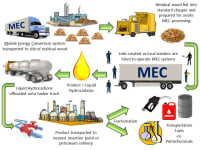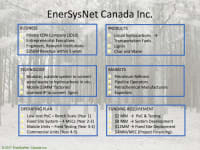
EnerSysNet Canada Inc. (ESN) will bring the factory to the forest by developing a network of, mobile energy conversion (MEC) systems to produce infrastructure-compatible aviation, gasoline and diesel range liquid hydrocarbons from timber harvest trimmings and sawmill waste. Because this approach utilizes sustainable lignocellulosic biomass feedstocks “in situ” thereby drastically reducing the logistics expense, efficiently utilizing such waste (typically about 30% or the felled tree) and thus converting a liability into an asset, the MEC offers a win/win for the forestry industry and renewable energy. Its competitive advantages (modest capital cost, high throughput, greater yield and higher quality) represent a major breakthrough.
The MEC integrates a patent-pending ablative fast pyrolysis reactor with recently-developed hydroprocessing catalysts to yield up to 105 gallons of liquid hydrocarbon per ton of biomass. Each self-contained system operating independently in remote settings will process approximately 120 dry biomass tons per day, nominally producing about 100,000 barrels of liquid hydrocarbon annually, along with sufficient synfuel to power the machinery, pure carbon in the form of biochar that can be sold or used for soil mediation, and significant quantities of fresh water.
With existing petroleum and chemical refineries as customers, the liquid hydrocarbon produced by the MEC requires only fractionation and finishing to become gasoline, diesel or aviation fuel. No new infrastructure is required to bring this product to commercial viability. Moreover, the MEC’s output contains no detrimental contaminants such as sulfur, nitrogen, or metals of any kind; and it yields more saleable product per barrel than the crude oil it would displace from the refiner’s inventory.
As a modular component of a highly scalable distributed production network, ESN will build the business organically by utilizing the existing feedstock volumes in any given area. By eliminating the biomass transportation cost and relocating to the next site when a job is done, the MEC network has no single point of failure, no orphan capital costs, low operating costs and a strong profitability delta.
These factors support a sales plan that values the liquid hydrocarbon at a premium to their chemically-equivalent crude oil competitors, even with current low prices. When this is coupled with the increasing value attached to carbon and GHG emission reduction (MEC liquid hydrocarbons are at least carbon-neutral, and offer a positive reduction when the value of the biochar produced concurrently is taken into account!) the enhanced value added is a compelling argument for both our feedstock suppliers, the refining industry, and the end-user customers buying MEC-derived fuels.
EnerSysNet Canada Inc. owns protected IP covering the entire MEC system, and expects that further development will yield additional valuable patents. The company has been seeking investment partners to complete a ‘proof of concept’ (PoC) demonstration that will pave the way for full commercialization. The peer review of this technology has included endorsements by the U.S. Department of Energy’s Bioenergy Technologies Office (BETO) and by Scientific Development Technology Canada (SDTC.)
-
Awards
-
 2018 Top 100 Entries
2018 Top 100 Entries
Like this entry?
-
About the Entrant
- Name:Jim Colthart
- Type of entry:individual
- Patent status:patented





